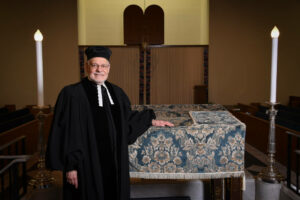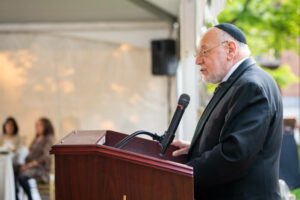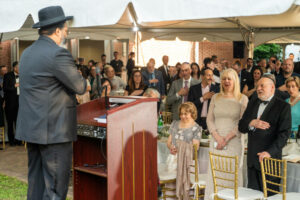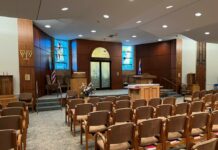
After Egypt lost the Gaza Strip and the Sinai Peninsula to Israel in the 1967 Six-Day War, the country that enslaved Jews in ancient times rounded them up and put them in prison camps.
Rabbi Albert Gabbai was one of them. The Cairo native spent three years in what he described as “a concentration camp.” Four of his brothers were already in the United States. When he was rounded up, Gabbai was awaiting his visa for immigration to the land of opportunity.
The rabbi got through those years. There was only one way to do so, he said.
“Faith in God,” Gabbai recalled.
Gabbai believed that “Israel would do something to get us out,” and he is still unsure of what happened behind the scenes. But in June 1970, he became a free man. And after a brief sojourn in France, he finally emigrated to the United States.
Gabbai went on to study at Yeshiva University in New York City and the Shehebar Sephardic Center in Jerusalem. As an American rabbi, he served the two oldest congregations in the country: Shearith Israel in New York and Mikveh Israel in Philadelphia.
After 35 years leading Mikveh Israel, he is retiring.
The congregation held a tribute event for its beloved leader on May 21. Rabbi Yosef Zarnighian, who arrived in Old City as Gabbai’s understudy in September 2021, will replace him.

Mikveh Israel opened in 1740. Early congregants fought for the American Revolution and contributed to the development of the United States. Centuries later, their synagogue’s rabbi would benefit from their efforts.
“Always trust in God,” Gabbai told the assembled congregants during his speech at his going away party.
The rabbi is the descendant of rabbis on his father’s side. And after his father died when he was 5, his older brothers carried on the family ritual of discussing Jewish texts like the Mishnah and Talmud at the Shabbat dinner table.
Upon his release from the prison camp, Gabbai was of high school age. As the rabbi remembered it, he wanted to attend college and “get a profession.”
The rabbinical path was a “natural occurrence,” he said.
Strangely enough, so was his journey to Philadelphia. As a young boy in a French school in Cairo, Gabbai’s teacher showed him a map of different countries. The map of the U.S. illuminated certain areas with “beautiful pictures,” the rabbi recalled in his speech.
Philadelphia had greenery, tulip flowers, the Liberty Bell and an image of Benjamin Franklin wearing a Colonial hat.
“I started dreaming of that place,” Gabbai said.

After arriving in New York in 1971, he took a bus trip to the city of his dreams. Almost two decades later, Gabbai got a call from a Mikveh Israel leader named Leon Levy. Levy had heard of Gabbai from a couple of the rabbi’s former teachers, and he wanted Gabbai to lead services at the city’s oldest synagogue.
The rabbi happily obliged, and then he never left. For 35 years, he has led by focusing on people.
“You have to have a sense of what your priorities are. And your priorities are the people you’re serving,” Gabbai said.
Gabbai never lost sight of that, according to many members.
“He’s always nice to everybody,” said Meir Tayar, a congregant for the last 16 years. “Always accepting of everybody.”
Several Mikveh Israel members mentioned Gabbai’s sense of humor in a 30-minute tribute video that the synagogue sent out. Gail Lindo, Gabbai’s administrative assistant since 2001, said that his sense of humor was “weird.”
“He always will come forward with a joke whether he’s seen it online or read it in a book,” she said. “They are the silliest jokes you’ve ever heard. Makes you laugh. But they’re silly.”
The rabbi is graduating to rabbi emeritus status, and he will still be around. But he also wants to stay out of the way. It’s Zarnighian’s time to lead. Gabbai is leaving his successor a congregation with 200 families and a property that just expanded to include an indoor/outdoor event space.
But many other features remain the same. For example, there’s still a walkway from the bimah to the ark flanked on both sides by pews. It’s an unusual setup for a sanctuary, but there’s a purpose, according to Gabbai.
“It’s for God,” he said, smiling.






